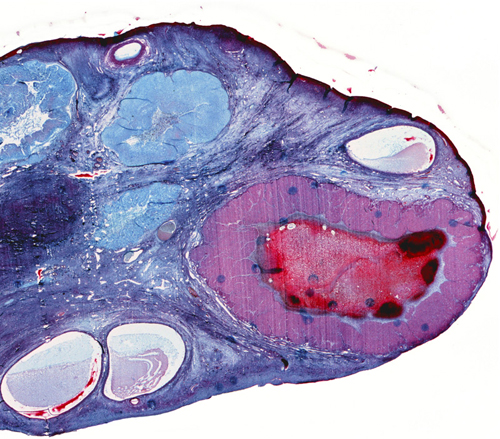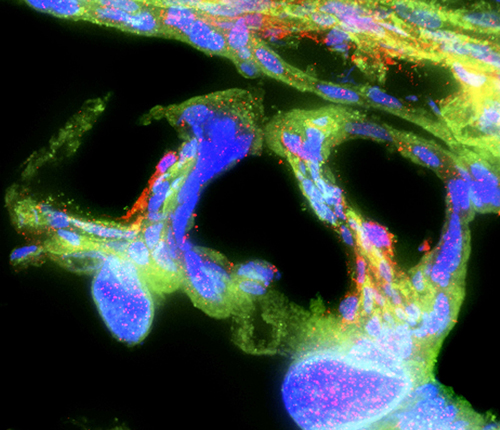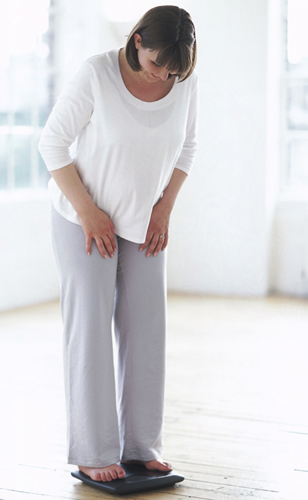You are 3 Weeks and 4 Days 255 days to go…
Do you feel different? You’ll find yourself analyzing every twinge in your body as you look for signs that you’re pregnant.
Your baby today
To embed itself in the lining of the uterus, the embryo-to-be
needs the help of progesterone, secreted after ovulation by the empty
egg follicle, the corpus luteum (shown in pink in this cross section of
an ovary). Progesterone helps the lining thicken.

It’s still very early and you’re unlikely to have pregnancy symptoms yet—although you may have some light spotting (see You are 3 Weeks and 5 Days).
Some women claim to “feel” pregnant, even before changes to their
breasts are noticeable or before they start feeling sick. Some women say
that they just “know.” You may be very in tune with your body and may
notice that your body is changing even before you are able to take a
test. Unfortunately, sometimes our minds can play tricks on us: you may
want to be pregnant so much that you can sometimes convince yourself
that you’re feeling different. If you don’t feel any different, don’t
worry, this is also completely normal.
Either way the only definitive way to know whether or not you are pregnant is to take a pregnancy test (see How to use a home pregnancy test).
You don’t need to go to your doctor to confirm your pregnancy since the
tests that they use are the same as those bought over the counter. If
the test is positive, you’re pregnant!
… Nutrition
Diet ban
If you were dieting before you conceived,
it can be tempting to continue once you find out you’re pregnant.
Don’t: diet, your baby may become undernourished and is more likely to
be premature and underweight at birth. Do, however, eat a healthy,
balanced diet. Don’t eat junk food when you’re pregnant since this can increase the risk of your baby developing weight problems.
If you are overweight
or obese, your doctor may recommend that you gain less weight than other
pregnant women. The recommended weight gain for overweight women is
15–25 pounds. And for obese women, the recommended weight gain is at
least 15 pounds. (By contrast, normal-weight women should gain 25–35
pounds during pregnancy.)
In an ideal world,
you should lose excess weight before conceiving, because obesity makes
you more prone to diabetes and high blood pressure and means you’re more
likely to need a cesarean.
… Nutritionist
| Q: |
Should I give up coffee in case I’m pregnant?
|
| A: |
The March of Dimes advises pregnant women or those trying to
become pregnant to drink no more than 200 mg of caffeine a day (that’s a
12-ounce cup of coffee). Going without your caffeine fix is a good
thing when you’re pregnant, since research shows that, in high doses, it
can increase the risk of miscarriage.
One study
discovered that pregnant women who consumed two or more cups of coffee
(or a caffeine-rich equivalent) were twice as likely to miscarry as
those who gave up caffeine. Before switching to decaff, be aware that
decaffeinated drinks may raise cholesterol. The good news is that many
women find they naturally stop wanting coffee in early pregnancy.
|

You are 3 Weeks and 5 Days 254 days to go…
As the fertilized egg becomes completely embedded in your uterus, it may cause some light bleeding.
Your baby today
The first stage of placental development—your baby’s life
support system—is shown here. The image shows nuclei (blue) within a
continuous network of cells that will become the placental villi. At
first the tiny villi are solid; later, they will contain blood vessels.

The ball of cells, known as the blastocyst, that will form the embryo has now completely embedded within the lining of the uterus and the lining has regenerated over it.
Unfortunately, in the
complex process of conception, only about half of all fertilized eggs
progress to become a blastocyst and only about half of these go on to
become successfully implanted in the uterus.
When the blastocyst
embeds, there may be some bleeding, known as “spotting.” This often
leads to confusion regarding the dating of the pregnancy, not least
because it can occur around the time that you would normally start your
period.
The color of the blood
can vary. In most cases it is pinkish, although bright red blood (fresh
blood) can occur, as can brownish, old blood. As long as it is not
profuse, the color really doesn’t matter. If the bleeding lasts for a
short period, and you don’t experience discomfort, it’s likely that
things are just fine, but do see your doctor for a checkup.
Around 25 percent of
women will experience some bleeding in early pregnancy, but most go on
to full term. However, in some cases, bleeding does mean a miscarriage
is occurring so always report the fact that you’ve bled to your doctor.
This computer-generated image
shows the ball of cells—the blastocyst—as it appears situated within
the uterus. The outer ring of interconnected cells that will eventually
form the placenta are clearly seen.

It is thought that around 50 percent of pregnancies might miscarry before implantation.
Up to a third of
pregnancies miscarry up to the fifth week and around a quarter will end
in miscarriage between the fifth and seventh week. Thankfully, the risk
of miscarriage becomes much lower as the weeks go by, decreasing
dramatically after the 12th week of pregnancy.
Doubling up
As with many parents,
you probably thought long and hard about trying to conceive your second
child. There’s no ideal age gap between children, but consider:
The pros:
You are in “baby mode”
and will be used to the routine and all aspects of baby care. You will
have all the equipment you need from bottles to a carriage and crib.
A two-year-old
might find it easier to accept his new sibling than a four-year-old who
is much more conscious of having the sole attention of his parents.
There will always be squabbles, but children close in age tend to play better together.
The cons:
It’s tiring caring for a one- or two-year-old while pregnant.
It can put a strain on your body to have pregnancies close together.
If you have a second baby before the first one can walk, you could be doing a lot of carrying, increasing the chance of backaches.
You won’t have as much time to get to know your first child before your second is on the scene.
You are 3 Weeks and 6 Days 253 days to go…
Complex changes are taking place inside your uterus to create a safe and nourishing environment for your unborn baby.
Your baby today
This microscope view of an embedded blastocyst shows the
amniotic cavity (semicircular white area at top), with the cells that
will develop into the baby just below (dark oval at the 12 o’clock
position). The yolk sac is the pink area below.

The ball of cells embedded in the uterus
is already laying down the foundations for its future life as an
embryo. At two layers thick, the germ cells form a flat disk that
divides the fluid-filled inner part of the ball of cells into two
chambers. The smaller of these fluid-filled chambers will become the
amniotic sac. The larger chamber, lying closest to the future placenta,
will become the yolk sac that supports the early embryo. The umbilical
cord will eventually develop close to the smaller chamber. The inner
germ cells have been developing at a slower rate than the rapidly
expanding outer cell layers.
At first the umbilical
cord is a simple stalk, containing no blood vessels but simply anchoring
the embryo to the future placenta (see You are 4 Weeks and 6 Days), which will eventually become your unborn baby’s lifeline.
… Nutritionist
| Q: |
I’m hoping I’m pregnant, but I’m already worrying about the
amount of weight I might put on, and am scared I’ll never be slim again!
|
| A: |
These days, it is almost impossible to pass a newspaper stand
without seeing the latest celebrity who has not only fit right back into
her clothes after having her baby, but who actually weighs less than
she did before pregnancy. However, this is concerning for health
professionals, since a dramatic weight loss after the birth is not good
for mother or baby.
The recommended weight gain during pregnancy is 25–35 lb, if you have a Body Mass Index (BMI) within the normal range. Your baby and her support system will make up a good proportion of this (see How much weight will you gain?),
as will the increased pregnancy fluids, fats, and an enlarged uterus.
Much of this extra weight will be lost as soon as your baby is born.
Also, after the birth, some of this extra weight provides nutrients for
breast-feeding, which uses up to 500 calories a day.
The most
sensible approach to controlling your weight during pregnancy is to eat a
healthy diet and get gentle exercise to ensure that weight gain is not
too dramatic. You should be aiming to eat around 2,100–2,500 calories a
day, increasing this by 200 calories in the last trimester of
pregnancy—the equivalent of a banana and a glass of milk.
|
Newborns are getting heavier.
This is mostly due to
improved diet and living standards. However, obesity in the mother is
another factor—if the mother is overweight, there is an increased risk
of diabetes , which can increase the baby’s weight.
You’ll gain weight in the months to come but not necessarily an excessive amount. Try not to become obsessive about weighing yourself.
